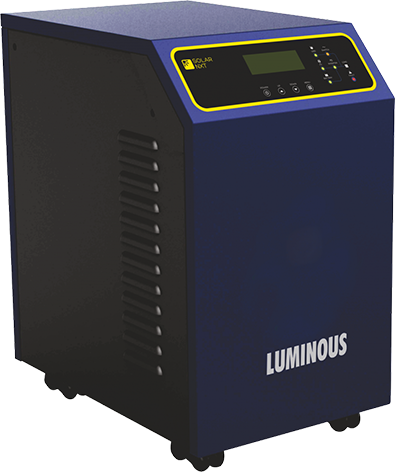Solar hybrid inverters function by transforming the DC voltage from panels to AC power which can be used for both utility grids and home appliances. The hybrid inverters also transfer the balance of electricity back to the grid or the battery. Hybrid inverters with solar battery charging have emerged as a highly efficient one-time investment that you can make. Let us understand why.
Hybrid inverters are widely used for domestic and industrial applications and serve as a secondary source of power in case there are power cuts from the electricity utility grids. A hybrid inverter with solar battery charging system comprises an inverter that runs on a solar battery.
This type of inverter generates altering current with the help of a heavy load transformer and driver circuitry. This solar battery charging system for hybrid inverters gets charged from two types of sources. The first one is the mains power supply. If this main supply of power is available, the relay then switches to the connection that uses the mains power supply to supply the load.
The Working of Hybrid Inverter with Solar Battery Charging Systems
Typically, a hybrid inverter is a combination of an off-grid and on-grid solar inverter. This inverter can store the solar power generated by solar panels in solar batteries, run your home appliances as well as export the excess solar power generated to grid.
These are highly versatile types of inverters and can operate with utmost ease without a grid. Let us now understand it’s working:
- The solar power supply charging the hybrid solar inverter battery charges it with the purpose of using it in form of a backup when there is a power outage.
- The usage of hybrid inverter with solar battery charging provides an additional advantage of surplus power in case of a power outage. A hybrid inverter with solar battery charging systems, therefore, lasts for a longer period and provides an uninterrupted supply of power.
- The main difference between solar battery and inverter battery is that they both have varying discharge ratings. The main task of a solar inverter is the conversion of DC power generated by the array into Alternating Current power. Hybrid inverters with solar batteries are a step ahead and work with batteries that help store the power in excess.

Advantages of Hybrid Inverter with Solar Battery Charging System
- Hybrid inverters can remain grid-connected and utilize a combination of renewable and non-renewable energy to charge batteries and offset loads.
- Hybrid inverters are increasingly finding use in both remote and residential applications in recent times.
- Hybrid inverters comes with 3-in-1 benefits: Store solar power generated by solar panels in solar batteries, run your home appliances as well as export excess solar power generated to grid, hence reducing your electricity bills.
- A hybrid inverter system helps solve issues of the variability of renewable energy along with unreliable grid structures. Hybrid inverters with solar battery charging system efficiently store power in the battery and then draw upon it based on the energy requirement.
- Even though hybrid inverters are slightly more expensive than conventional inverters. It works by storing electricity to batteries and exporting the excessive electricity back to the grid.
Applications of Hybrid Inverter with Solar Battery Charging Systems
- The number of applications of these hybrid inverters has witnessed an expansion over the last few years to include large capacity grid connected systems and microgrids. Conventionally, hybrid inverters have found more use in developing areas with little or no access to a more reliable power grid.
- Users choose to use these hybrid inverters for storing energy for self-consumption and provide backup power in time of emergency and export excess solar power generated to grid. However, in the developing world, these hybrid inverters with solar battery charging system are a necessity as it compensates for the lack of grid electricity and intermittent grids together. In fact, microgrids in India are also driving the adaptation of hybrid inverters.
- Basically, for locations with a higher potential for losing the grid frequently, you should consider a hybrid inverter for off-grid operation.
In simpler terms, if you want to take advantage of both savings and backup, it is best to consider a hybrid inverter for off-grid operations. It can be therefore said that the flexibility of a hybrid system adds to the many benefits of a solar system installation. The hybrid inverters with solar battery charging systems are also increasingly becoming an important part of the off-grid solar energy supply system.
Leave a Reply